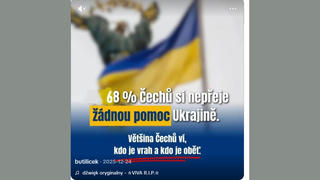
Was the Istanbul Convention created by the globalists to take away parental rights and diminish their authority over their children by banning corporal punishment? No, that's not true: The Convention is an international treaty of the international humanitarian organization the Council of Europe, ratified by dozens of countries, aimed at combating violence against women and domestic violence, which can involve children. Corporal punishment has been linked to mental illness and increased aggressiveness in children and is harmful to children in any form, according to experts.
The claim appeared in a video (archived here) on TikTok on October 25, 2023. The person in the video says (translated from Czech to English by Lead Stories staff):
Istanbul treaty is terror from globalists, meant to take away the authority of corporal punishments from parents. Why the state power does not give up corporal punishments? Why it coerces people and beats people?
This is what the post looked like on TikTok at the time of writing:

(Source: TikTok screenshot taken on Wed Nov 1 08:08:47 2023 UTC)
The Istanbul Convention, formally known as the Council of Europe Convention on Preventing and Combating Violence Against Women and Domestic Violence, was initially open for signature in Istanbul in May 2011. This comprehensive treaty establishes a legal framework for addressing violence against women and domestic violence. It officially came into force in 2014. Currently, 34 member states of the Council of Europe have approved the Convention, while 12, including the Czech Republic, have only signed it, according to the Council of Europe website. Its approval has evolved into a contentious political issue in some countries, and it has been the subject of considerable disinformation, primarily centered around gender-related concerns.
"The convention's ratification signifies the rejection of interpersonal violence," explained Andrea Kysela, a gender expert at the Europeum think tank, in a phone conversation with Lead Stories on October 2, 2023. According to Kysela, the document outlines a comprehensive framework for preventing and supporting victims of domestic violence, including children, who are particularly susceptible to such abuse. She pointed out that the Czech Republic has already ratified other conventions concerning children's rights that address this issue, and it should have led to the prohibition of such violence. Criticism has arisen from the fact that the country has not yet made corporal punishment illegal, a stance that has also drawn disapproval from the United Nations and the European Council. The Czech Republic is one of the few countries where this form of violence remains legal, Kysela added.
The Czech Republic´s Ministry of Justice is preparing an amendment to the Civil Code, that, if approved, would result in such a step, Novinky.cz news website reported on October 23, 2023.
The country ratified the UN Convention on the Rights of the Child in 1993, a treaty that encompasses the issue of corporal punishment. Numerous studies have demonstrated that even the occasional use of corporal punishment by parents is linked to an increased risk of developing mental disorders and heightened aggression in children. Experts assert that putting an end to corporal punishment for children leads to the enhancement of parental competencies and the provision of better tools, ultimately fostering a more harmonious family atmosphere.
The ratification of the Istanbul Convention is causing a deep divide in the Czech political landscape, drawing opposition from various political spectrums. Critics argue that the treaty encompasses gender ideology, could result in the indoctrination of children regarding gender issues and might undermine traditional family roles. These claims persist, despite the European Commission's efforts to debunk them. While the Czech government approved the treaty ratification in June 2023, the final decision still hinges on endorsement from both chambers of parliament, where it encounters significant opposition, Novinky.cz reported.
The Council of Europe, which prepared the Istanbul Convention, is a humanitarian organization, founded in 1949. It has now 46 member states, including Turkey, Montenegro, Armenia, and Moldova.










